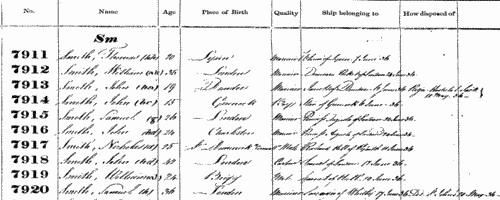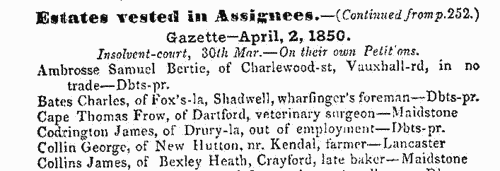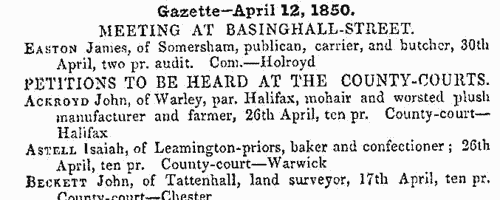Rossie Surname Ancestry ResultsOur indexes 1000-1999 include entries for the spelling 'rossie'. In the period you have requested, we have the following 15 records (displaying 1 to 10): Buy all | | | Get all 15 records to view, to save and print for £74.00 |
These sample scans are from the original record. You will get scans of the full pages or articles where the surname you searched for has been found. Your web browser may prevent the sample windows from opening; in this case please change your browser settings to allow pop-up windows from this site. Scottish litigants, rebels and cautioners
(1585-1592)
The Privy Council of Scotland exercised a superior judicial authority in the kingdom, and consequently received and dealt with a constant stream of petitions, as well as dealing with the internal security of the state. This register of the council from 1 August 1585 to 31 July 1592, in the reign of king James VI, was edited by David Masson, and published under the direction of the Lord Clerk Register of Scotland in 1881. Some of the individuals mentioned are the complainants, those of whom they complained, and the sureties on both sides: at this period, some of the complainants are alleging serious attacks, often of a feuding nature. Many of the bonds entered into by the cautioners are promises to keep the peace towards such enemies. Failure to answer to the council when summoned was a serious contempt, leading to being denounced a rebel, with serious consequences. But 'horning' was also used in the pursuit of debts: there was no imprisonment for debt in Scotland, but a creditor could have an obstinate debtor ordered, in the sovereign's name, to pay what was due, failing which, the debtor could be put to the horn, denounced as a rebel, and imprisoned as a rebel. The main text (to page 774) is from the Acta Secreti Concilii, containing the minutes of the Privy Council, with intermixed Acta Proper (political edicts), Decreta (judicial decisions), Acta Cautionis (acts of caution) and Bands (registration of bonds). After that are printed some miscellaneous Privy Council documents from the same years: additional acts of caution (775-778); ordinances and acts anent the Borders and the North (779-814); and miscellaneous privy council papers (815-834). The sources most productive of names, the Acta Cautionis and Registration of Bands, are also the most repetitive in form, and are not transcribed verbatim and literatim: nevertheless, one of the editor's rules was for 'All proper names and names of places occurring in the originals to be preserved in the abstracts without exception, and in the exact original spelling.'
ROSSIE. Cost: £4.00.  | Sample scan, click to enlarge

| Scottish litigants, rebels and cautioners
(1592-1599)
The Privy Council of Scotland exercised a superior judicial authority in the kingdom, and consequently received and dealt with a constant stream of petitions, as well as dealing with the internal security of the state. This register of the council from August 1592 to May 1599, in the reign of king James VI, was edited by David Masson and published under the direction of the Deputy Clerk Register of Scotland in 1882. The publication brings together the contents of the principal register (Acta Secreti Concilii) with acts and bands (bonds) of caution (surety) from the registers called Acta Cautionis (pp 561-730); Acts and Ordinances relating to the Borders and the North (731-748); and Miscellaneous Privy Council Papers (749-769). Many of the individuals mentioned are the complainants, those of whom they complained, and the sureties on both sides: at this period, many of the complainants are alleging serious attacks, often of a feuding nature. Many of the bonds entered into by the cautioners are promises to keep the peace towards such enemies. Failure to answer to the council when summoned was a serious contempt, leading to being denounced a rebel, with serious consequences.
ROSSIE. Cost: £4.00.  | Sample scan, click to enlarge

| Masters of Merchantmen
(1817)
Notices of Leith Shipping from The Scotsman for February 1817: Arrived, Cleared Out, and Loading for Foreign Ports. For each ship the master's surname and the port of origin is usually stated.ROSSIE. Cost: £6.00.  | Sample scan, click to enlarge

|  British merchant seamen
(1835-1836) British merchant seamen
(1835-1836)
At this period, the foreign trade of ships plying to and from the British isles involved about 150,000 men on 15,000 ships; and the coasting trade about a quarter as many more. A large proportion of the seamen on these ships were British subjects, and so liable to be pressed for service in the Royal Navy; but there was no general register by which to identify them, so in 1835 parliament passed a Merchant Seamen's Registration Bill. Under this act this large register of British seamen was compiled, based on ships' crew lists gathered in British and Irish ports, and passed up to the registry in London. Each seaman was assigned a number, and the names were arranged in the register by first two letters of the surname (our sample scan shows one of the pages for 'Sm'); in addition, an attempt was made to separate out namesakes by giving the first instance of a name (a), the second (b), and so on. But no effective method was devised to prevent the same man being registered twice as he appeared in a second crew list; moreover, the original crew lists were clearly difficult for the registry clerks to copy, and some of the surname spellings appear to be corrupted. A parliamentary committee decided that the system devised did not answer the original problem, and this register was abandoned after less than two years: but it is an apparently comprehensive source for British merchant seamen in 1835 to 1836. The register records the number assigned to each man; his name; age; birthplace; quality (master, captain, mate, 2nd mate, mariner, seaman, fisherman, cook, carpenter, boy &c.); and the name and home port of his ship, with the date of the crew list (usually at the end of a voyage). Most of the men recorded were born in the British Isles, but not all (for instance, Charleston and Stockholm appear in the sample scan). The final column 'How disposed of' is rarely used, and indicates those instances where a man died, was discharged, or deserted his ship during the voyage.ROSSIE. Cost: £8.00.  | Sample scan, click to enlarge

| Officials in the British colonies
(1841)
The Royal Kalendar lists officials in the British colonies, arranged by continent: in Gibraltar, Malta, the United States of the Ionian Islands (Corfu, Cephalonia, Zante, St Maura, Ithaca, Cerigo and Paxo), and Heligoland in Europe; in Lower Canada, Upper Canada, Nova Scotia, New Brunwick, the Island of Prince Edward, Newfoundland, Jamaica, the Bahamas, Honduras, Barbadoes, St Vincent, Grenada, Tobago, Trinidad, St Lucia, Antigua, Montserrat, St Christopher's, Nevis, the Virgin Islands, Dominica, British Guiana, Berbice and Bermuda in the Americas; Ceylon, New South Wales, Van Diemen's Land, Western Australia and South Australia in Asia (and Australasia); Cape of Good Hope, St Helena, Mauritius, Sierra Leone and Gambia in Africa.
ROSSIE. Cost: £6.00.  | Sample scan, click to enlarge

| Insolvents imprisoned for debt in England and Wales
(1850)
Perry's Bankrupt and Insolvent Gazette, issued monthly, included brief notices of insolvents' estates surrendered to assignees. Each entry gives the surname and christian name of the insolvent, trade and address, followed by the name of the prison. This is the index to the names of the insolvents, from the issues from January to December 1850.ROSSIE. Cost: £6.00.  | Sample scan, click to enlarge

| Insolvents in England and Wales
(1850)
Perry's Bankrupt and Insolvent Gazette, issued monthly, included lists of insolvencies and stages in the process whereby the insolvents petitioned for release from debtors' prison. The insolvent is generally referred to by name (surname first), address and trade. This is the index to the names of the insolvents, from the issues from January to December 1850.ROSSIE. Cost: £6.00.  | Sample scan, click to enlarge

|  Inhabitants of Southwark in Surrey
(1851) Inhabitants of Southwark in Surrey
(1851)
The 1851 census return for St George the Martyr, Southwark, registration district: London Road sub-district: enumeration district 13: described as: "Johnston's Buildings - Obelisk Yard - Waterloo Road (east side) to Munroe's, end of Parish (West side) commencing at the Cabinet Maker's corner of Whiting St to Procters, end of Road - Duke St (north side) from Locksmith's to No 49 and Bale's Court." This area lay in the parish of St George the Martyr, Southwark. The addresses listed in the actual returns are 1 to 4 Johnston's Buildings, 1 to 18 Obelisk Yard, 1 to 6 Obelisk Buildings, 1 to 15 James Terrace, 1 to 10 Brighton Place, 1 to 6 Haddow Place, 1 to 5 Oxford Place, 2 to 22, 34 to 36 and 81 to 85 Waterloo Road, 29 to 35 Oxford Terrace, The George, 1 to 5 Paget Place, 49 to 75 Duke Street, and 2 to 3 Bales Court.ROSSIE. Cost: £4.00.  | Sample scan, click to enlarge

| Traders and professionals in London
(1851)
The Post Office London Directory for 1851 includes this 'Commercial and Professional Directory', recording about 80,000 individuals. ROSSIE. Cost: £4.00.  | Sample scan, click to enlarge

| Debtors, Insolvents and Bankrupts
(1881)
Bills of sale (binding assets to a creditor/lender), insolvencies and bankruptcies in England and Wales, July to September 1881ROSSIE. Cost: £6.00.  | Sample scan, click to enlarge

|
| 1 | 2 |  |
Research your ancestry, family history, genealogy and one-name study by direct access to original records and archives indexed by surname.
|













